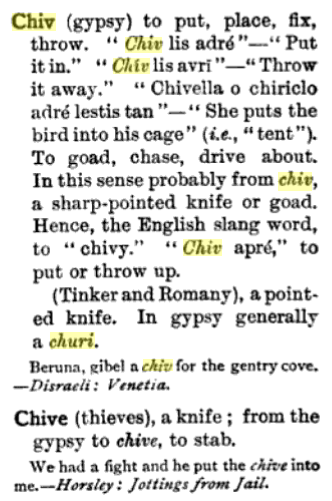Practically everyone has read (or seen in a film or on TV) about a situation in which someone "stuck a shiv" into someone else. The image is of some kind of dagger, and the most common use I have observed for shiv is as a term for the kind of makeshift dagger used by prison inmates.
I use the term dagger because the shiv in this case appears to be a thrusting weapon, not a slashing one. Yet its etymology is not really clear. Etymonline describes it this way:
"a razor," 1915, variant of chive, thieves' cant word for "knife" (1670s), of unknown origin.
The American Heritage Dictionary weights in with:
A knife, razor, or other sharp or pointed implement, especially one used as a weapon. [Probably Romani chiv, blade.]
Several other sources plump for the Romani explanation, dating from the early 20th century, but while Collins says the term's origin in British English is the Romani one, it insists that the American term is from 1855-60, although on the subject of actual origin it is strangely mute. This makes me suspect it also favors the Romani origin—but how?
All this seems something of a muddle. Certainly the usages may have sprung up independently, but then there's that "of unknown origin" given by Etymonline, dating it from the 17th century. Can anyone provide a clearer picture?
Side note: I wonder if there could be some kind of line traceable between this term and one meaning of shiver, about which Etymonline says:
"small piece, splinter, fragment, chip," c. 1200, perhaps from an unrecorded Old English word, related to Middle Low German schever schiver "splinter," Old High German scivero, from Proto-Germanic *skif- "split" (source also of Old High German skivaro "splinter," German Schiefer "splinter, slate"), from PIE root *skei- "to cut, split." Commonly in phrases to break to shivers "break into bits" (mid-15c.). Also, shiver is still dialectal for "a splinter" in Norfolk and Lincolnshire.
When I entertain this term in my mind's eye I see a sharp shard of glass or ceramic that could look very much like a dagger.



